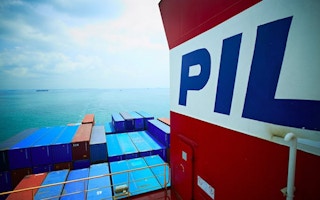Singapore shipping company Pacific International Lines (PIL) has admitted to dumping oily wastewater in United States waters.
To continue reading, subscribe to Eco‑Business.
There's something for everyone. We offer a range of subscription plans.
- Access our stories and receive our Insights Weekly newsletter with the free EB Member plan.
- Unlock unlimited access to our content and archive with EB Circle.
- Publish your content with EB Premium.
PIL admitted to knowingly polluting American waters and attempting to cover up the incidents by falsifying records.
The company is to pay a fine of US$3 million, and the engineers responsible for the polluting discharge face up to three to six years in prison, a US federal court has ruled.
The latest incident occurred in the Western Pacific island of Guam, where the PIL vessel Kota Harum was found to have discharged its waste oil while docked at Apra Harbor in October 2019. The ship was detained by the US Coast Guard pending an investigation.
The court accused the vessel’s chief engineer and a second engineer of overseeing the discharge and faking the ship’s oil records. Both pleaded guilty.
PIL has committed to ocean clean-up efforts and pledged to avoid further pollution violations.
“
Hopefully it is a wake up call to rogue operators, but rather concerning that it is being done by large operators with Singapore-registered ships. It suggests it is a practice that is pervasive throughout the industry.
Andrew Dixon, director, Nikoi Island and Cempedak Island
PIL told Eco-Business that an officer on board the Kota Harum had taken “prompt actions” to stop the discharge, and contacted the local agencies within one hour of the bilge dumping. The spillage had been cleaned up within 45 minutes, the company said.
It added that it has “enhanced and implemented additional measures to prevent accidental and operational discharge from fleet vessels against international and local regulations.”
The case marks the second time in two months that a Singapore shipping company has been convicted of pollution offenses. In December 2020, Pacific Carriers Limited, pleaded guilty to discharging waste oil in numerous US ports. Pacific Carriers’ engineers were also found to have falsified oil records to conceal the incidents.
Rarely policed, the discharge of wastewater from the bilge tanks in the hulls of ships — an act known as bilge dumping — is a common but underreported problem. Bilge dumping is a daily occurrence in Southeast Asia, where the problem is the most acute.
Bilge dumping breaks an international law called the International Convention for the Prevention of Pollution from Ships, or Marpol. Ships are required to treat bilge water by removing the oil before it is released into the sea.
Andrew Dixon, a hotelier who runs two island resorts in Indonesia and campaigns to highlight the issue, said that he hoped that the prosecutions were a “wake-up call to rogue operators”.
However, he noted that the illegal practice was being conducted by large operators with Singapore registered ships, which suggests that bilge dumping is “pervasive throughout the industry”.
“It maybe that the criminal prosecution of the two crew members has the greatest impact [to deter further cases of bilge dumping],” he told Eco-Business.










